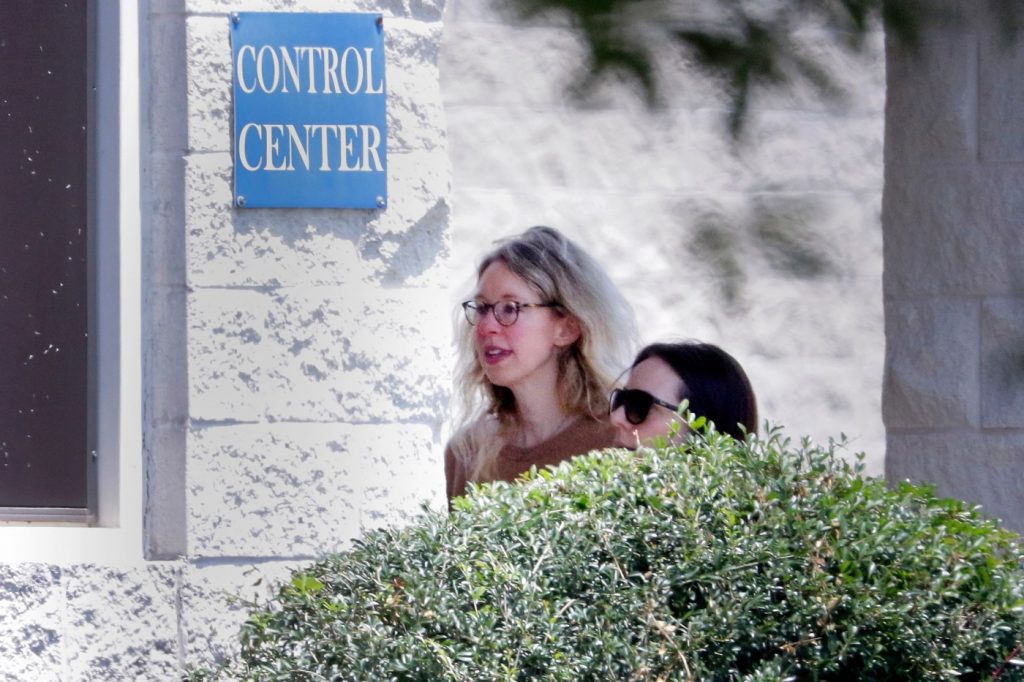A lawyer for imprisoned fraudster Elizabeth Holmes on Tuesday appeared to make headway with the trio of judges weighing her bid for a new trial.
Holmes, 40, was convicted by a jury in early 2022 on four felony counts of defrauding investors in Theranos, her now-defunct Palo Alto blood-testing startup. On Tuesday her appeal was heard in the U.S. Court of Appeals for the Ninth Circuit in San Francisco, with one of her lawyers and a prosecutor facing off before a three-judge panel.
Holmes lawyer Amy Saharia claimed Judge Edward Davila, who presided over the trial in U.S. District Court in San Jose, had improperly allowed former Theranos scientist Dr. Kingshuk Das to give expert testimony before the jury. Appellate court Judge Ryan Nelson indicated in comments Tuesday that she may have a point.
“There’s a pretty good story here for Ms. Holmes,” Nelson said. “They do have a pretty good basis for some unfairness here.” Even so, he noted that her conviction is supported by “pretty overwhelming evidence.”
Much of the 50-minute hearing was consumed by arguments over whether the judge in Holmes’ trial broke court rules by letting Das tell the jury his opinions about how poorly Theranos’ technology performed. Appeals courts can order new trials if they find trial judges made mistakes in applying the law or if proceedings were not fair.
Jurors in Holmes’ four month trial in San Jose U.S. District Court heard that Das’ examination of Theranos’ processes and technology led him to void all the test results — 50,000 to 60,000 of them — from the company’s problematic ‘Edison’ blood-analyzer devices. Das told the jury that after he informed Holmes that her devices “were apparently malperforming from the very beginning,” she countered with an “alternative explanation” that the problems arose from the company’s quality-assurance processes, not its machines.
But Saharia argued that statements by Das, including, “I found these instruments to be unsuitable for clinical use,” broke court rules and jurors should never have heard them. His testimony about whether the technology worked represented opinions based on scientific evidence, and under court rules, such statements in a jury trial can only come from witnesses who go through the court process of being deemed experts, Saharia argued.
Nelson said he had “some problems” with the testimony Davila allowed Das to provide, and suggested that prosecutors used Das to “to get in some of that testimony” that should have only come from an expert witness.
Federal prosecutor Kelly Volkar told the judges Davila “carefully parsed” Das’ testimony and sustained several objections from Holmes’ lawyers when Das was being questioned on the witness stand.
“This was a case where every issue was often litigated to death,” Volkar said, adding that Davila “took great care in making rulings.”
Judge Jacqueline Nguyen said Davila properly allowed Das to discuss what he told Holmes. But Nguyen appeared to agree that the testimony requiring “highly specialized knowledge” was not appropriate for a witness not court-approved as an expert.
Saharia said Holmes’ legal team does not dispute that Theranos testing was inaccurate.
“The central issue in this case was whether Ms. Holmes knowingly misrepresented the capabilities of Theranos’ technology,” Saharia said. “She in good faith believed in the accuracy of this technology.”
Holmes, a Stanford University dropout, was charged in 2018 in connection with $878 million in losses among Theranos investors. Davila pegged the hit to investors resulting from her criminal conduct at $381 million.
In November 2022, Davila sentenced Holmes, a mother of two young children, to 11 years and three months in prison. Holmes, U.S. Bureau of Prisons inmate No. 24965-111, has slashed about two years off her sentence — likely through good behavior and taking programs at her minimum-security prison — and is scheduled to walk free in August 2032.
Theranos, founded by Holmes in 2003 and once valued at $9 billion, claimed its machines could use just a few drops of blood from a finger-prick to perform more than a thousand tests, for everything from diabetes and cancer to pregnancy and HIV infection.
Jurors in Holmes’ trial heard evidence that Holmes doctored internal Theranos documents by adding pilfered pharmaceutical companies’ logos to suggest the firms had validated her technology, and that she and Theranos had falsely suggested to investors that her machines were in battlefield use. The jury also heard that Theranos provided investors with wildly inflated revenue expectations and that it sought to cover up the poor performance of its machines.
Federal criminal appeals succeed at very low rates, according to the federal courts system. If Holmes loses, she could appeal to the U.S. Supreme Court, but its justices only hear about 100 to 150 appeals per year of the more than 7,000 it is typically asked to review, according to the courts system. The judges Tuesday did not say when they would rule on her appeal.
Also on Tuesday in the same court, a lawyer representing Holmes and former Theranos president Sunny Balwani argued before the three judges that Davila’s order that the pair pay more than $450 million in restitution to investors should be thrown out.
Patrick Looby, a lawyer representing Holmes and Balwani, argued that their fraud did not rob Theranos of its “residual” value. “The fact that the investors may have had difficulty selling their shares is not owing to the fraud,” Looby asserted. “It’s just the nature of investing in a private company.”
Volkar argued that victims had “no opportunity” to recoup their costs.
Nelson appeared to agree.
“If you can’t recoup,” Nelson said, “it’s not residual value.”


